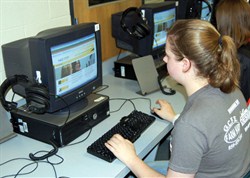
By Wayne Dominick
Every mechanic knows the best tools are those that can do more than one thing. School administrators are learning the same holds true for several innovative programs that give students a different path to graduation.
One of those programs is Competency-Based Graduation, which allows students to earn credits based on their performance on standardized tests as opposed to standard coursework. Using this approach, students could earn enough credits to graduate in less than the customary four years and start their college careers one, and possibly two, years earlier than their peers.
PHOTO: Allie Haggarty uses the computers at WHS to check on one of her assignments in the Criminal Justice class she takes at NKU.
The Boyle County school district is considering this strategy, while Williamstown Independent is laying the groundwork – but they have different reasons for using the approach.
Williamstown first steps
The staff at Williamstown High School had students who could graduate early, but they wondered if it was in the best interests of the student.
“There are a few Doogie Howsers out there who would thrive in that atmosphere, but for the most part, I don’t think the average 15- or 16-year-old is ready for college,” said Instructional Supervisor Misty Middleton.
Superintendent Sally Skinner decided that before the district started offering students a competency-based system to earn credits, it had to develop a program for those students who could earn them.
“We didn’t want to just start offering students a way to graduate without preparing them for the future. We want our kids to be successful after they leave us,” she said.
Working with Middleton, Williamstown High School Principal Dave Johnstone and Career and Academic Adviser Brandy Feagan, Skinner developed a program that brings college to the student instead of sending the student to college.
The result is the Williamstown Academy, a collaboration with Northern Kentucky University that allows students to take classes at a satellite campus in Grant County.
“We think this is a special program,” Skinner said. “These kids aren’t just getting credits; they’re getting a real college experience. They leave here and go to NKU, where they sit in classes with other college students.”
Not only do Williamstown students go to NKU, but some NKU students come to Williamstown High School for their science credit.
“We are fortunate enough to have a teacher here with a doctorate,” who can teach college-level biology, Feagan explained.
Senior Allie Haggarty jumped at the chance to take college courses when it was offered to her. “It’s a great way to get a head start on college,” she said. “Plus, the fact that I’m earning college credits saves my parents a lot of money. They like that a lot.”
Easton McClanahan said the Academy allows him to make a gradual adjustment to college work. “It’s not that the courses are necessarily harder, it’s just that the way they’re taught is a lot different. You have to do lot of the work on your own and that takes some getting used to,” he said.
“This is the best of both worlds,” said Stephanie Axe. “We get to take college courses and still get to enjoy high school. We still get to participate in athletics and other things. It’s great.”
Of course, programs like the Williamstown Academy come with costs.
“We’re very fortunate to have a board that looks beyond dollars and cents and works for ways to provide our students with programs that will give them every opportunity possible,” Skinner said. She said the board and the students share the cost of the college credits. “Our district has a trust and the board is using the proceeds from that to help pay for the program.”
Skinner said the success of the Academy will enable Williamstown to adopt a competency-based program so students will be able to take more college courses while in high school. School officials estimate students will be able earn as many as 34 credit hours before they leave.
Boyle County preparation
Boyle County Superintendent Michael LaFavers sees a different purpose for competency-based graduation. He said 85 percent of his district’s students go on to college, and many of them earn college credits through a dual-credit program with Western Kentucky University. But LaFavers is worried about other students.
“We have some kids who have had to miss a lot of school for various reasons. They know the material and can do the work, but they don’t have the required number of hours in the classroom. A competency-based program would allow us to get these kids a diploma,” he said.
Boyle County does not yet have a program in place. LaFavers stressed that he and his staff want to make sure that when they do start using it, it will be designed to help those students who really need it and not as a crutch for those who simply don’t want to work in class.
“We want to be sure that our graduates are truly college- and career-ready when they leave here,” he said.
LaFavers added that competency-based credits will be used very sparingly in his district. “I don’t imagine that more than 3 or 4 percent of our students will earn competency-based credits,” he said. “It’s just not something that will be used a lot. I see it more of being one more tool we can use when we need.”
And as any good mechanic will tell you, you can’t have too many useful tools.
— Dominick is a writer from Frankfort